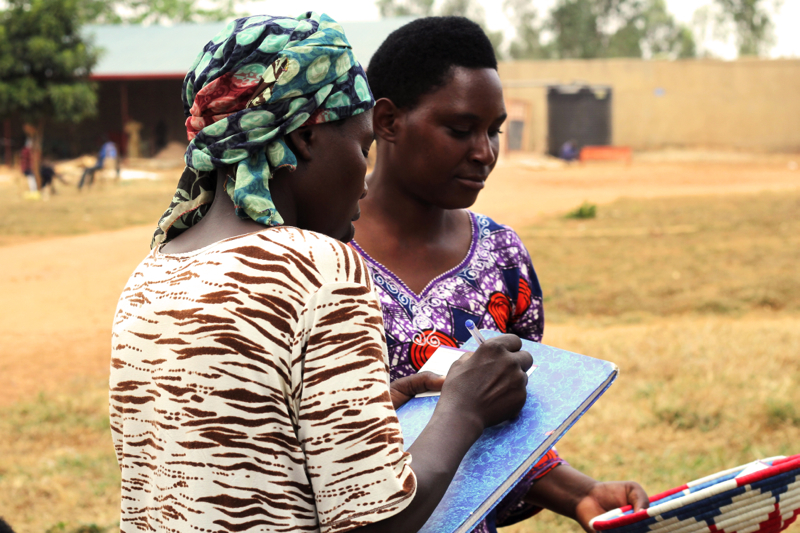
Mission
Indego Africa is social enterprise that supports women in Rwanda through economic empowerment and education. The organization partners with cooperatives of female artisans and sells their handmade jewelry, home decor and accessories through its e-commerce site, boutiques worldwide and collaborations with major brands. Indego Africa pools 100 percent of profits from sales with grant support and donations to fund job skills training programs for its partners in business management, entrepreneurship, technology, literacy, and health. Through sales, women earn income to meet their families’ basic needs. Through training, women gain the tools to become financially independent.
Life Challenges of the Women Served
2014 marked the 20th commemoration of the Rwandan genocide when over 800,000 people died over 100 days of unimaginable violence. As a result of the genocide, the surviving women have played a central role in reconstructing and revitalizing their country.
Following the genocide, women comprised 70 percent of Rwanda’s remaining population. With many women widowed or with imprisoned husbands, the number of women heading households soared. These women were left to rebuild the country, yet many of them remained trapped in cycles of poverty, lacking the education and resources to lift themselves out.
When Indego Africa began, the majority of its artisan partners had their educations interrupted by the genocide and without markets in which to deploy their artisan skills, they were making less than $1.00 a day. Women have begun to emerge as powerful leaders, entrepreneurs and community changers. However, in order to sustain this momentum, it is crucial that women receive advanced training to further develop their business and leadership skills.
The Project
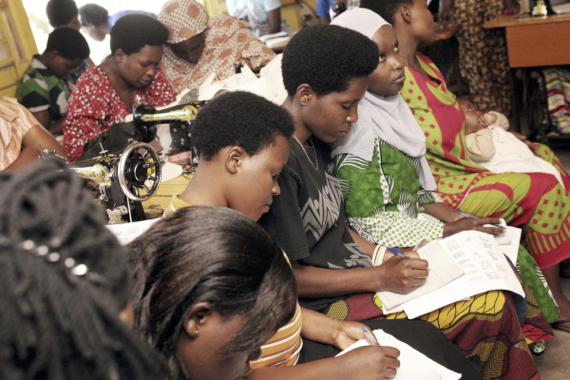
Over the two-year period, three groups of participants will be enrolled and trained and will graduate from the Leadership Academy (100 artisans). They will receive two days of training for six months. Up to 16 separate artisans will serve as Teaching Fellows and up to eight will serve as Program Assistants. The program will include 1,102 hours of class time (348 hours per cohort), 18 – 21 mentorship or networking events (6 -7 per cohort), 20 – 22 special projects and assignments completed (5 -7 per cohort), 75 assessments (including pre-assessment, mid-term, final and homework) (25 per cohort), 66 class reports prepared by Teaching Fellows (22 per cohort) and 18 monthly progress reports prepared by Program Coordinator (6 per cohort).
The mentorship and networking opportunities will include events such as monthly visits to participants’ cooperatives, field trips to raw material suppliers, shipping companies, and other entities operating along the artisan value chain and informational visits with local entrepreneurs, government agencies and other relevant business or regulatory experts.
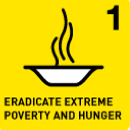
Questions for Discussion
- How do you think graduates of The Leadership Academy can use their training to mentor others?
- How do you think the artisan cooperatives benefit women entrepreneurs, aside from the ability to sell their products?
- In the aftermath of genocide, how do you think women have been able to emerge as leaders in Rwanda?
How the Grant Will be Used
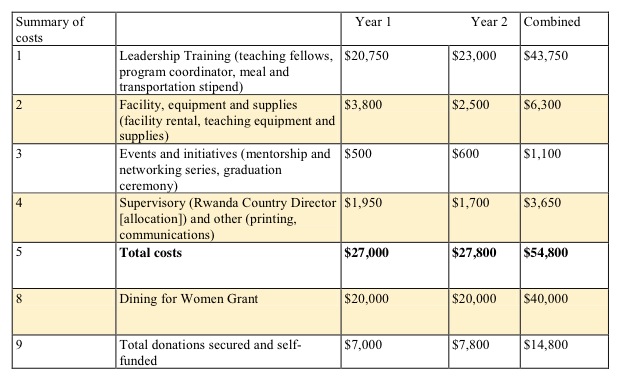
A two-year, $40,000 grant will fund Indego Africa’s Leadership Academy and provide emerging artisan leaders with the knowledge and skills to excel as independent businesswomen and drive economic and social progress in communities across Rwanda.
The Leadership Academy will directly serve 106 women over the course of its first two years –100 as students, four as teachers and two as teaching assistants. It will indirectly benefit 600 women who currently partner with Indego Africa, as they will be able to learn from the 100 Leadership Academy participants at their cooperatives. It will improve the lives of the artisans’ families and communities through increased income generation and transferable business acumen. Artisan partners have, on average, 5 dependents. Accordingly, income earned through partnership with Indego Africa supports approximately 3,000 people. For children, that income is frequently applied to pay school fees, an investment in the next generation in Rwanda.
Why We Love This Project/Organization
The artisan cooperatives produce high quality, sustainable products. The Leadership Academy allows the artisans to move to the next step in developing advanced business skills to improve the management and performance of their cooperatives. The goal is to engage with global markets and generate more income for the artisans.
Evidence of Success
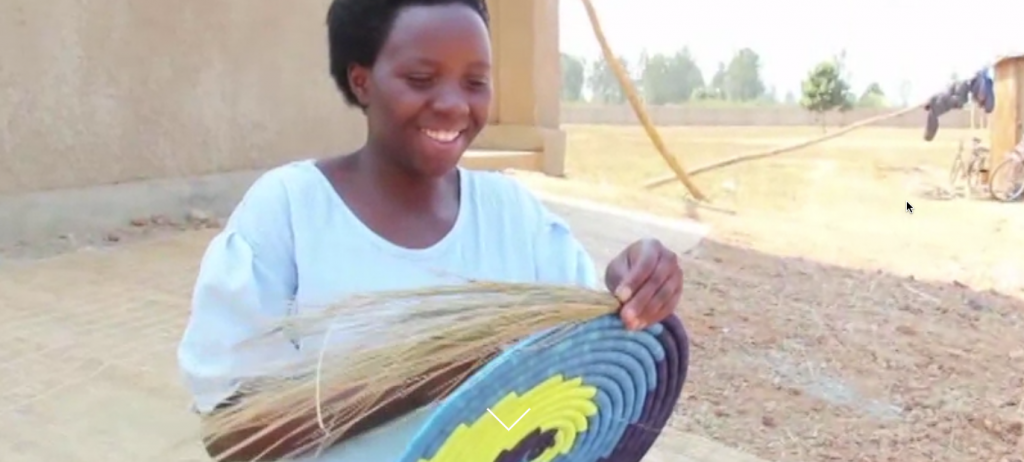
Since its launch, Indego Africa has administered thousands of lessons for its artisan partners in business management, entrepreneurship, literacy, health and human rights. These programs have won accolades and led to inspiring and tangible impact. A majority of Indego Africa’s partners now hold prominent leadership roles in their cooperatives and communities, including president of the Parents’ Association, development officer at the National Women’s Council, president of Avega Agahoza (Rwandan Genocide Widows Association) and vice president of the Youth Council. These are women poised to engage the global markets on their own terms as independent businesswomen. Indego Africa’s Leadership Academy and other reimagined training initiatives are intended to take advantage of this new and inspiring reality.
Voices of the Girls
“Through the Leadership Academy, I have become a businesswoman. There is a water problem in my community. At the Academy, I learned how to identify a need and create a business plan to fill it. I am now saving money to start selling water to help people in my village.” – Vestine Mutesi, Ejo Hazaza Cooperative
“I am now a well-to-do woman. I can eat what I want, wear what I want. I am confident, independent, and self-sufficient. I think back to what I was like only a few years ago and I do not recognize myself. And that is a good thing.” – Domitille, Hope Cooperative
“The Leadership Academy changed my life. My husband died in the Genocide and I’m a single mother. I have so many responsibilities and for so many years I wasn’t able to cover my family’s basic needs. Before I enrolled in the Academy, I didn’t know how to open a bank account let alone how to run a business. Now I am saving money and using the lessons I’ve been learning to help my cooperative grow. I see a bright future for myself and my family.” – Annociatha, Abasangiye Cooperative
“Indego Africa has given me more control over my life, and taught me that my future is my own. I do not have to beg for anything from my husband anymore. I feel independent and strong. I used some of the income I made through Twiyubake’s partnership with Indego Africa to open a shop on the side, selling basic household goods like food staples, wood and charcoal.” – Jacqueline, Twiyubake Cooperative
About the Organization
Indego Africa was incorporated in October 2006 by Matthew Mitro and his father, Tom, who worked for Chevron in Africa during the mid-1970s through the 1990s. Matt Mitro grew up living with his family in Nigeria and Angola. The Mitro family observed the entrepreneurial spirit of African female artisans. They also observed the women’s difficulties in scratching together a living without access to markets to sell their goods or educational opportunities to help them run their businesses more efficiently. Matt left his career as an attorney and founded Indego Africa in order to address these issues of access and opportunity. Indego Africa launched its initial operations in Rwanda because of its strong business and regulatory environment, its lack of corruption and the presence of export-ready female artisans. Indego Africa pools 100 percent of its profits from product sales with grants and donations to fund job skills training programs for its artisan partners in business management, technology, entrepreneurship and literacy.
Where They Work
Indego Africa partners with cooperatives across Rwanda, though they are primarily clustered in four districts: Bugesera, Gasabo, Kicukiro and Kayonza. Rwanda is located in Central Africa, east of Democratic Republic of the Congo. It is slightly smaller than the state of Maryland. Most of the country is savanna grassland with the population predominantly rural. It is the most densely populated country in Africa.
Rwanda is a poor rural country with about 90 percent of the population engaged in mainly subsistence agriculture and some mineral and agricultural processing. Tourism, minerals, coffee and tea are Rwanda’s main exports. The 1994 genocide decimated Rwanda’s fragile economic base, severely impoverished the population, particularly women, and temporarily stalled the country’s ability to attract private and external investment. Despite progress in stabilizing and rehabilitating its economy, a significant percent of the population still lives below the official poverty line.
Source Materials
Indego Africa, CIA World Factbook
